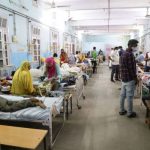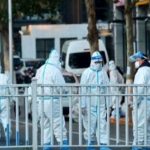Following the sudden rise in COVID-19 cases in Madagascar, President Andry Rajoelina has re-imposed lockdown on the country’s central region until July 26 as the five public hospitals in the capital, Antananarivo, announced they could no longer cope with the influx of patients.
According to reports these hospitals will only accept patients with the most severe forms of COVID-19.
The number of confirmed cases in Madagascar reached 7,153 on Monday, including 62 deaths.
Only one person per household is allowed to go out to buy food or medicine. The initial lockdown in March was lifted after four weeks.
The government also opened a 400-bed treatment center for people with mild symptoms and is importing about 1,000 oxygen machines.
Since April, the president has been in the news when his country launched an indigenous herbal remedy named Covid-Organics, which he said could “cure” COVID-19.
The herbal remedy, developed by the Malagasy Institute of Applied Research, was produced from artemisia, a plant with proven antidote against malaria.
“All trials and tests have been conducted,” President Rajoelina said in April, “and its effectiveness in reducing the elimination of symptoms have been proven for the treatment of patients with COVID-19 in Madagascar.”
The World Health Organisation cautioned the use of the remedy as its efficacy and side effects have not been specifically proven.
Countries like Tanzania, Liberia, Equatorial Guinea and Guinea-Bissau, received consignments of the herbal remedy.
Nigeria also received its share of what state authorities described as “brotherly love” from the Malagasy government to all African countries.
Nigeria’s Health minister, Osagie Ehanire, at a Presidential Task Force on COVID-19 briefing said findings from the analysis of herbal medicine shows that it largely contains anti-malaria components.
He, however, said relevant government agencies will continue the process of evaluation to determine its effectiveness in treating COVID-19.














